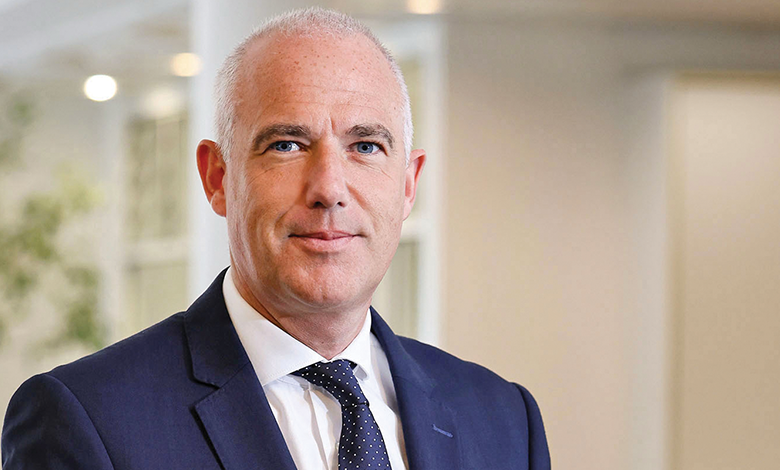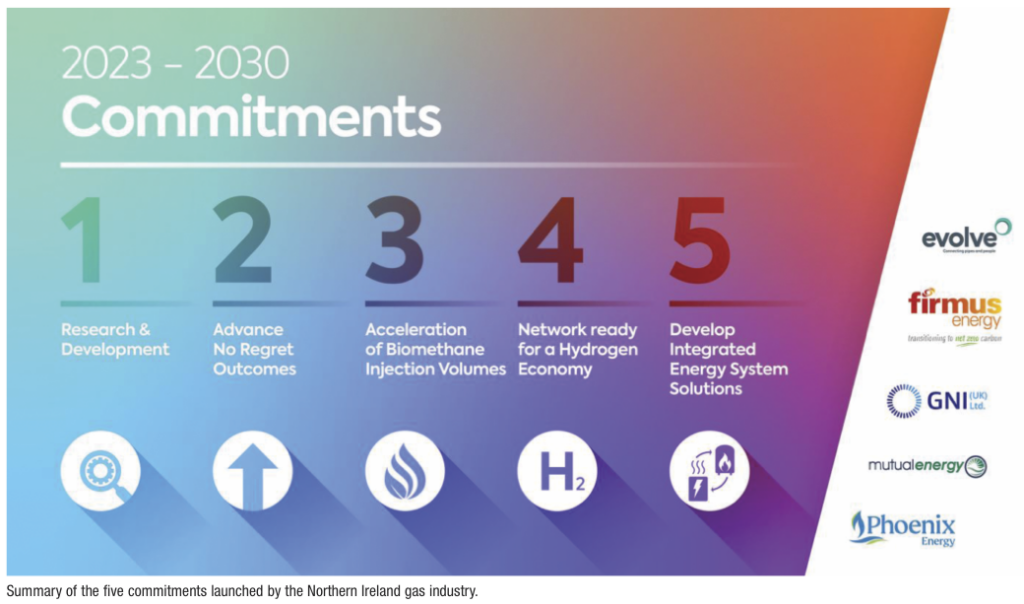Committed to transition

Jonathan Martindale, Director of Business Development, Phoenix Energy discusses the publication of the gas industry’s five commitments to decarbonisation.
“Isn’t it funny how day by day nothing changes but when you look back everything is different.”
C.S. Lewis.
As we are now well into the final quarter of another year, it is often the time of the year when businesses and organisations have their sights on end-of-year performance, what still needs to be done to meet annual objectives, what projects need that final push to close out by year-end.
We can often be so caught up in the daily and weekly business priorities that measuring progress or momentum across a strategic objective such as the colossal task of regional decarbonisation, which will span over three decades of delivery, can be both difficult and feel rather futile as the progress made versus the final goal can be underwhelming.
The terms net zero and 2050 are now intertwined, you cannot see one without the other. Type in 2050 into a Google search and net zero appears and vice versa. There is no doubt that the shift in momentum that the 2050 language has created since first introduced around 2019 has been considerable.
The political, business, industry, and consumer conversation has largely shifted from questioning why and if this is the right thing to do, to how and when can it be done most effectively, efficiently, and with the least disruption. Importantly, in a manner that the challenges become economic opportunities that once and for all aligns the three stools of the energy trilemma, affordability, security of supply, and sustainability.
Therefore, as we reflect on the four-year period between 2019 and 2023, things do feel different. Mindsets have changed, there is a recognition that change is coming, regional pathways are being shaped, research and development projects are informing future strategy, local companies are emerging as potential international leaders in this space, and local councils are collaborating with industry to shape local areas plans.
“2050 targets will not provide the tangible level of accountability that we as a region must now strive for.”
Jonathan Martindale, Director of Business Development, Phoenix Energy
Furthermore, the Northern Ireland Energy Strategy and two successive action plans, that the Department for the Economy is leading on, are providing the foundations for success. Our world class regional academic institutions have not been found wanting and the leadership that the Department of Agriculture, Environment and Rural Affairs (DAERA) has provided across the Green Growth Strategy has helped create valuable circularity to this discussion.
It feels, however, that notwithstanding the progress that has been made, we are now entering into a new chapter of the decarbonisation journey. The baton is now transferring from establishing the foundational principles to the implementation of early adopter projects, the ability to meet milestone targets and bite by bite get on with ‘eating into’ our regional ‘elephant’.
A key enabler as Northern Ireland enters this new phase will be our ability to meet milestone targets that sit underneath a longer term 2050 vision. 2050 targets will not provide the tangible level of accountability that we as a region must now strive for. It is a nebulous space and one that is not empowering those charged with delivery and suitably
resonating with those that are part of the journey.
It should be no surprise therefore that the successful delivery of an energy transition, one of the most transformational societal changes in many a generation will need to adopt an increasingly near-term focus.
We therefore very much welcome the change in dynamic that the June 2022 Climate Change Act has provided triggering the establishment of carbon budgets and the shaping of a Northern Ireland Climate Action Plan. The principle is very simple: How can we very simply deliver progress in this first carbon budget 2023-2027 (which has already begun), meet our 2030 milestone targets, and keep us on track for our long-term goal. Slippage now just means that we will have even more to do in the next two decades of this transition.
Five Northern Ireland gas industry commitments
In mid-October Phoenix Energy hosted the annual Northern Ireland Renewable Gas Conference, attended by over 250 local delegates from across the sectoral landscape, who heard from leading local, national, and international contributors. At the conference, Phoenix Energy CEO Kailash Chada set the scene by outlining five Northern Ireland gas industry commitments that will be key in making sure the region meets its 2030 targets.
The five targets stretch across a number of key industry themes and are ambitious, but we believe to be entirely deliverable and once achieved will further demonstrate the credentials of the gas industry as being an enabler for change and springboard the industry into the 2030s with positive momentum and the next tranche of carbon emissions abated.
The recent launch of the gas network operator’s five commitments was an output of four years of meticulous engagement with industry, academia, policy makers, and energy users to fully understand the local energy landscape. We have left no stone unturned in understanding how the £1 billion gas network asset in Northern Ireland that provides fuel choice to over 550,000 properties in Northern Ireland, provides space heat and hot water to domestic customers, provides high thermal heat output to our commercial and industrial enterprises, and plays a critical role in a resilient decarbonised power system, can most effectively decarbonise the energy we distribute.
The key learnings that have come from this period of academic partnerships, market research, engagement with best practice emerging markets and local network modelling have formed the basis on our 2030 commitments. Whilst the key learnings are considerable, there are two that I believe underpin the principles of our five commitments most clearly.

Firstly, it has become very clear that whilst decarbonisation is a global challenge, the drivers for success will be via locally shaped regional strategies. We have seen across Europe that countries are embedding their own regional DNA into their decarbonisation pathways. Denmark is a great example of a region using its agricultural economy to displace over 40 per cent of its natural gas with biomethane solutions. Spain has become the world’s leader in concentrated solar power and is forging a key role as a long-term exporter of green hydrogen and renewable electricity.
We should actively seek out and embrace best practice from other regions however we must not be under the illusion that in due course we can simply wait and apply those solutions in Northern Ireland. If we do so we will simply be left behind, miss the opportunities to attract green investment into the region, become sustainably uncompetitive and stagnate.
We need to embrace the rich energy landscape and indigenous resources we are blessed with, to pursue a pathway of best fit in Northern Ireland. These are not in short supply when you consider the modern polyethylene plastic gas network that we have locally, the comparably high amounts of agricultural waste we have per capita that can be used to create biomethane, the high levels of wind generation success currently enjoyed, and the continued potential that exists, coupled with the valorisation of wind curtailment, and the availability of local energy storage facilities.
Whilst it should not require visitors from other regions to remind us just how well placed we are, this is a common observation from visiting industry delegates, who marvel at these features and the enviable scale in which we operate.
The second key learning has been that in our regional pursuit of 2030 milestone targets, there is no shortage of no-regret actions that can be progressed today, that can reduce carbon immediately, reduce what needs to be done in the medium term, and critically move at a pace that energy users and consumers are likely to embrace.
The reality is that in some areas the leadership and demands of large corporate businesses are overtaking that of policymakers. For example, multinational supermarket chains have set their own 2030 carbon reduction targets which show no lack of ambition. It is not uncommon for over 90 per cent of supermarket chain carbon emissions to come from their supply chain.
We as a region therefore urgently need to ensure that our agri-food sector which is part of supermarket supply chains across the UK, Ireland, and Europe has access to green energy solutions and can in turn continue to meet the contractual and procurement requirements that will allow them to be sustainably competitive.
We trust that the publication of these commitments provides a clarity of message from an industry that
will be key to the delivery of decarbonisation in Northern Ireland, provides transparency to the work that we are progressing, and an additional layer of accountability to the pathway that we feel so passionate about.
The one certainty is that collaborative partnerships across industry, energy system providers, policy makers, and end users will be key to the delivery of an integrated energy system, with a suitably diverse mix of solutions that best serves Northern Ireland energy consumers. In that regard, we are looking forward to working with our established supply chain partners and establishing new partnerships in the coming months.
There is no reason why we cannot look back in 2030 and reflect once more on just how much has changed.
To read the commitments in full, visit phoenixenergyni.com/Commitments
T: 03454 55 55 55
W: www.phoenixenergyni.com







